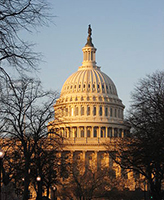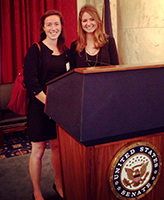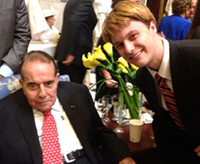
Breaking into the political world of Washington, D.C. brings its own set of challenges. “How do you talk to someone who is not of the same political slant you are?” asks Anita Rees, a career exploration specialist in Notre Dame’s Career Center. “What do students need to know to find a job in D.C.? How is the protocol there different from other cities?”
Thanks to the Notre Dame D.C. Mentoring Program, students can find answers to these questions and get valuable career advice from successful Notre Dame graduates who were once in their shoes.
The Career Center program pairs students who intern in the Washington, D.C. area with Notre Dame alumni working there. It is open to students with summer internships, as well as those who participate in the Washington Program—a semester-long experience combining internships with political science coursework offered by the College of Arts and Letters’ Rooney Center for the Study of American Democracy.
“The D.C. Mentoring Program helps students explore a career path and gain professional advice,” Rees says. “Many times, the mentor and mentee continue their relationship and connection after the summer or semester.”
Career Strategy
 Arts and Letters students Kathryn Suarez (left) and Sarah McGough (right) attend a Notre Dame alumni event in Washington, D.C.
Arts and Letters students Kathryn Suarez (left) and Sarah McGough (right) attend a Notre Dame alumni event in Washington, D.C.
Senior Kathryn Suarez, an economics and political science double major in the College of Arts and Letters, interned last summer at Booz Allen Hamilton, a Washington D.C.-based consulting firm.
During her internship, she provided pipeline analysis for various proposals, determining what types of projects the company should pursue. She also spent 30 days working on a $70 million government proposal.
Through the D.C. Mentoring Program, Suarez was able to meet with two Notre Dame alumni, one of whom works at the U.S. Department of State.
“The program provided me the opportunity to meet people outside my work environment,” says Suarez, who hopes to work for the State Department following graduate school. “I had a support group that said, ‘you’re doing great so far, but these are some things you can do to make yourself more competitive.’”
Suarez says she appreciated that both of her mentors were recent Notre Dame graduates who understood her perspective and helped her strategize about her future career.
“The first time we met, we talked about what I was looking for long term, and they talked about their experience and what they did,” she says. “Then, they both put me into contact with people in more specific fields I was interested in.”
They also emphasized the value of making those connections, she says. “I learned to maintain those relationships and whenever you meet someone to further that relationship. Don’t take anything for granted and continually loop back in.”
Empowering Students
 Senior John Vernon attended Bob Dole’s 90th Birthday party while interning in Washington, D.C.
Senior John Vernon attended Bob Dole’s 90th Birthday party while interning in Washington, D.C.
While in Washington, interns meet regularly with their mentors and are encouraged to ask any questions they may have—not only about the mentor’s particular career but also about any aspect of their internship or D.C. political culture.
“The students truly drive the questions that are asked, the issues that are discussed,” Rees says. “They set the goals of what they want to learn from their mentors.”
Senior John Vernon, a psychology and science pre-professional major, interned during summer 2013 at American Continental Group, a public policy consulting firm in D.C. As a research analyst, he had the opportunity to attend congressional hearings on the Hill, research clients, and prepare reports for lobbyists.
Vernon, who hopes to pursue a career in science and technology policy, says he appreciated seeing “the applications of science in the political arena.”
Through the D.C. Mentoring Program, Vernon was partnered with an editor at The Pew Charitable Trusts. While his mentor’s career path was different than what Vernon intends to pursue, the experience has been extremely beneficial.
His mentor, Vernon says, encouraged him to ask himself critical questions about his career path.
“It was interesting because his background was very different from mine,” Vernon says. “He had a background in journalism and was always asking those difficult questions to people. That kind of mindset challenged me to think about my own life.
“He asked things that you don’t think about on a day-to-day basis, but the questions are still relevant, still important. So, it was very insightful and critical for my development.”
The Art of Networking
Students who are planning an internship in Washington, D.C. may apply to the D.C. Mentoring Program through the Career Center. Once selected, participants attend a training session and list their top three choices for mentors who represent a career area they would like to explore. Taking the student’s career interests and choices into consideration, the Career Center will match the student with a mentor.
One of the key benefits of the mentoring program, Rees says, is that it allows students to become more comfortable with networking and knowing how to make those things happen in a natural way.
“As we all know, the world of jobs is greatly facilitated by networking,” Rees says. “Our mentors assist students in terms of networking with other alumni or within other fields that the student may want to explore.”
Suarez agrees and encourages other students to take advantage of the opportunities Notre Dame offers in terms of connecting to the University’s powerful alumni network.
The alumni, she says, “want to do what they can to help get you to where you want to go because they were in your position not too long ago.”


